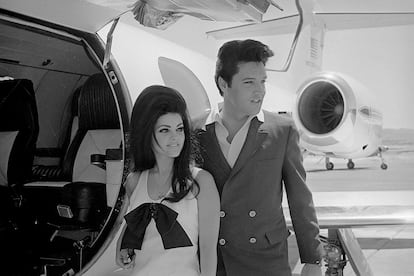Memphis Mafia confirms: Priscilla was victim of Elvis’s worst side
The documentary ‘Elvis & Priscilla: Conditional Love’ turns to the King of Rock’s entourage to tell the story of the toxic relationship between the singer and the woman he kept in a golden cage

When it comes to biographers, spoilers are admissible. Before watching Priscilla, Sofia Coppola’s film about Elvis Presley’s girlfriend, then wife, then widow, which was released in theaters to critical acclaim, I resorted to a voluntary spoiler: seeing the new documentary about their toxic relationship, which was at the time presented in the media as the height of romance and which, when seen with today’s eyes, was tragic. It’s called Elvis & Priscilla: Conditional Love, it’s on Prime Video and it must be mentioned that its release was timed to coincide with a renewed interest in the King, though it doesn’t seek to compete with the feature films that have recently explored his and Priscilla’s life and times.
The allure of Conditional Love lies in the fact that it compiles the testimony of a series of witnesses on the shared life of one of the early, great rock stars and the girl who he locked up as a teenager in the golden cage of Graceland, Elvis’s mansion in Memphis. Elvis did not create his genre (Black artists did that, stars like Chuck Berry, Little Richard and Sister Rosetta), but he did bring it to the masses with his perfect voice, beauty, white skin and his way of moving those hips. The primary voices in the documentary belong to the Memphis Mafia, Elvis’s circle of friends who accompanied him everywhere, stroked his ego, worked for him as assistants and bodyguards and (less successfully) tried to look after him. We meet a few of the guys who were closest to him, who attended his wedding: Lamar Fike, Sonny West, Marty Lacker and the man that Elvis considered his best friend, Jerry Schilling. Some of these conversations come from earlier recordings, necessary as the first three men are now dead.
Priscilla Ann Beaulieu Wagner was 14 years old, and had lost her father when she was young (he was a pilot who died in an in-flight accident) and moved several times with her mother and stepfather, the latter an Air Force official who was stationed at the U.S. military base in Friedberg, Germany. She was bored and friendless when a 24-year-old Elvis Presley came to perform his military service. They met at a party. According to the documentary, the rock star was initially more infatuated than in love with her. When he returned to Los Angeles, he convinced the girl’s parents to take her with him. It didn’t take him long to have her under lock and key in Graceland, while he headed to Hollywood to film movies. By then, Elvis “had more girlfriends than friends,” say the guys.
She called herself “Elvis’s personal living doll.” The singer wanted a virginal adolescent by his side who he could mold to his whim; for letting off steam in bed, he had others. The Mafia confirms the version that Elvis and Priscilla did not consummate their relationship until their wedding night in 1967, after an eight-minute ceremony in Las Vegas. Elvis was pushed into the marriage by his sinister manager, Colonel Parker. “They’re forcing me to get married,” he reportedly cried that day.
Lisa Marie was born nine months after the wedding. Priscilla didn’t want to get pregnant so soon, but Elvis wouldn’t let her take birth control pills. His behavior was paradoxical: he had previously introduced her to other pills (some to keep them awake, others to sleep) that he himself abused. Nor were they often intimate after they became parents: the documentary claims that Elvis was not attracted to any woman who was a mother. When he settled in Las Vegas, he didn’t take her with him. According to his friends, she was the one who was married — Elvis lived a bachelor’s life. Priscilla fought back against this loneliness with at least two ephemeral affairs with her teachers, one who gave her dance classes and another who taught her karate.
The couple’s relationship was insane from beginning to end. At some point, say the Mafia members, Priscilla wanted Elvis to distance himself from them — she did have her reasons. However, when Schilling approached Priscilla to see if she was alright, Elvis raged with jealousy, even when he knew his behavior was uncalled for. When she reproached him for his affair with actress Ann-Margret, he told her, “I want a woman who understands that things like this can happen. Are you that woman?” Scenes of violence are also recounted, lamps flying around the bedroom, strife that the omnipresent friends could hear from the other side of locked doors. And worst of all, that one day, after a long period of not even wanting to touch Priscilla, Elvis raped her.
They got divorced in 1972 but, since public image was so important, they left the courthouse holding hands. Elvis’s companions are frank in their telling of the story of the singer’s plummeting physical and mental health, a deterioration accentuated by his drug addiction, until his death in 1977. And yet, the Mafia believes that after the divorce, Elvis and Priscilla’s relationship improved, and even that a certain complicity between the two emerged. When Elvis died, Priscilla made moves towards devoting herself to managing his legacy. But she didn’t keep its dark moments to herself: in 1985, she wrote the autobiographical Elvis and Me, with brought to light her misfortunes, and was made into last year’s Priscilla. Coppola says that her film does not keep Elvis on a pedestal, but neither does it make him out to be a villain. She prefers not to judge him.
The artist was so major, he still is, that his dark side escaped us. Really, it was no secret, you just had to pay attention.
Sign up for our weekly newsletter to get more English-language news coverage from EL PAÍS USA Edition
Tu suscripción se está usando en otro dispositivo
¿Quieres añadir otro usuario a tu suscripción?
Si continúas leyendo en este dispositivo, no se podrá leer en el otro.
FlechaTu suscripción se está usando en otro dispositivo y solo puedes acceder a EL PAÍS desde un dispositivo a la vez.
Si quieres compartir tu cuenta, cambia tu suscripción a la modalidad Premium, así podrás añadir otro usuario. Cada uno accederá con su propia cuenta de email, lo que os permitirá personalizar vuestra experiencia en EL PAÍS.
¿Tienes una suscripción de empresa? Accede aquí para contratar más cuentas.
En el caso de no saber quién está usando tu cuenta, te recomendamos cambiar tu contraseña aquí.
Si decides continuar compartiendo tu cuenta, este mensaje se mostrará en tu dispositivo y en el de la otra persona que está usando tu cuenta de forma indefinida, afectando a tu experiencia de lectura. Puedes consultar aquí los términos y condiciones de la suscripción digital.









































